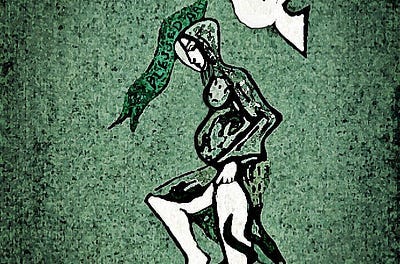Matthew 22.34-46
Cliches aside, it’s straightforwardly not the teaching of the scriptures that God’s too big to be put in a box. Rather, God has chosen the smallest of all possible boxes— Mary’s womb— to place himself.
Until we can answer Jesus’s question (“Who do you say that I am?”) none of the questions we ask about God can answer what God wants us to know.
“Hang on,” Jesus says to us in Sunday’s lectionary Gospel, “I’ve got a question for you. What do you think about the Messiah? Who’s son is he?”
Here in Matthew’s Gospel, we’re in the temple— we’re at church— with Jesus, and for some thirty verses we’ve been assaulting poor Jesus with the kinds of questions imaginative sinners like us ask.
How do you feel about the current administration, Jesus? We didn’t vote for him. Should we pay taxes to that lying, conniving grifter?
How about heaven, Jesus— what’s it like beyond those pearly gates? Let’s say I married my brother’s widow. Who’s wife is she going to be in the kingdom?
Give us some homework, Jesus, some marching orders. Of all the oughts and shoulds in scripture, Jesus, what do you think is the greatest?
And Jesus answers so hastily it’s almost as though he’s bored by us or he thinks the things we think are important are beside the point.
“Render unto Caesar what is Caesar’s and render unto God what is God’s!”
“Why are you bothering to speculate about heaven? God is the God of the living not the dead.”
“And why are you asking me about the most important ought? It’s already in your Bible, people. Deuteronomy 6: “Love the Lord your God with all your heart…”
And then Jesus goes on the offensive before we have a chance to make a break for the coffee hour, “Now, let me ask a question of you.”
“What do you think about the Christ? Who’s son is he?”
And we all stare down at the sanctuary carpet unsure if this is a trick question or just a stupid one.
“Uh, that’s an easy one, Jesus. Don’t you remember the palm branches from the other day? ‘Hosanna to the son of David.’”
“Really?” Jesus replies, “You think so? Is that your final answer?”
And we all look across the pews to check with each other before we nod our agreement.
“Well then, you tell me,” Jesus says, hopping up and pulling a pew Bible out of the rack, “How is it that David, when he’s caught up in the Holy Spirit, calls the messiah, Lord?”
“Yahweh says to my Adonai,” says Psalm 110, “The Lord says to my Lord, sit at my right hand until I make your enemies your footstool.”
“If the messiah is just another ordinary mortal like David, then why the heck did David call him Lord? And what’s he doing sitting in glory at the right hand of the Lord— a place, scripture’s clear, no creature can sit?
“I am the Lord, that is my name;” God says to the prophet Isaiah, “my glory I give to no other, nor my praise to idols.”
“Remember Moses,” Jesus adds, “Moses came closer than anyone to the glory of God, up on Mt. Sinai, and it so marred him— transfigured him— that Moses had to wear a veil over his face for the rest of his life.”
Only God can abide in the glory of God and by it be not consumed.
“Jesus Christ is the name of God,” says Karl Barth, “Otherwise, do we really have anything to talk about other than ourselves when we claim to be talking about God?”
Jesus Christ, the one who lived briefly, died violently, and rose unexpectedly is God. That’s the claim Christians make about the world, and today Jesus tells us that that claim is more important and far more interesting than any of the questions we like to bring to God.
“How can a son be lord of father?” St. Augustine asked, preaching on Sunday’s text in the fourth century.
Augustine’s answer:
“Jesus is great David’s greater Son: David’s lord always; David’s son in time.”
Augustine continued:
“David’s Lord, born of the substance of his Father, David’s son, born of the Virgin Mary, conceived by the Holy Ghost. Let us hold fast to both…He was made that which He made…Very Man, Very God; God and Man, whole Christ. This is the Christian faith.”
And this is why, though it’s doubtful Psalm 110, is your favorite psalm, it is the New Testament’s favorite psalm, quoted thirty-seven times.
Psalm 110 is the New Testament’s favorite psalm, quoted thirty-seven times.
It’s the only psalm to make it into the creeds. Charles Wesley had Psalm 110 in mind when he wrote his Christmas carol, “Veiled in flesh the Godhead see, Hail th’ incarnate Deity! Pleased as man with man to dwell, Jesus our Emmanuel.”
“So tell me again,” Jesus says to us, “What do you think about the messiah? Who’s son is he? Who do you say that I am?”
And Matthew reports not one of us had the chutzpah to “answer him a word nor from that day forward did anyone dare to ask Jesus any more questions.”
I wonder—
I wonder if they’re afraid because Jesus has just said, “I’m not just David’s son; I’m David’s God.
Or, are they afraid because Jesus has just told them that God has not come among them to answer their questions but to put his enemies under his footstool.
Hang on, Jesus— enemies? I thought Jesus loved everybody, even Jim Jordan, so who are Jesus’s enemies? I thought Jesus was the friend of sinners, a first century Mr. Rogers, a Jewish Joel Osteen without the private jet.
Enemies?
Keep reading with a 7-day free trial
Subscribe to Tamed Cynic to keep reading this post and get 7 days of free access to the full post archives.





